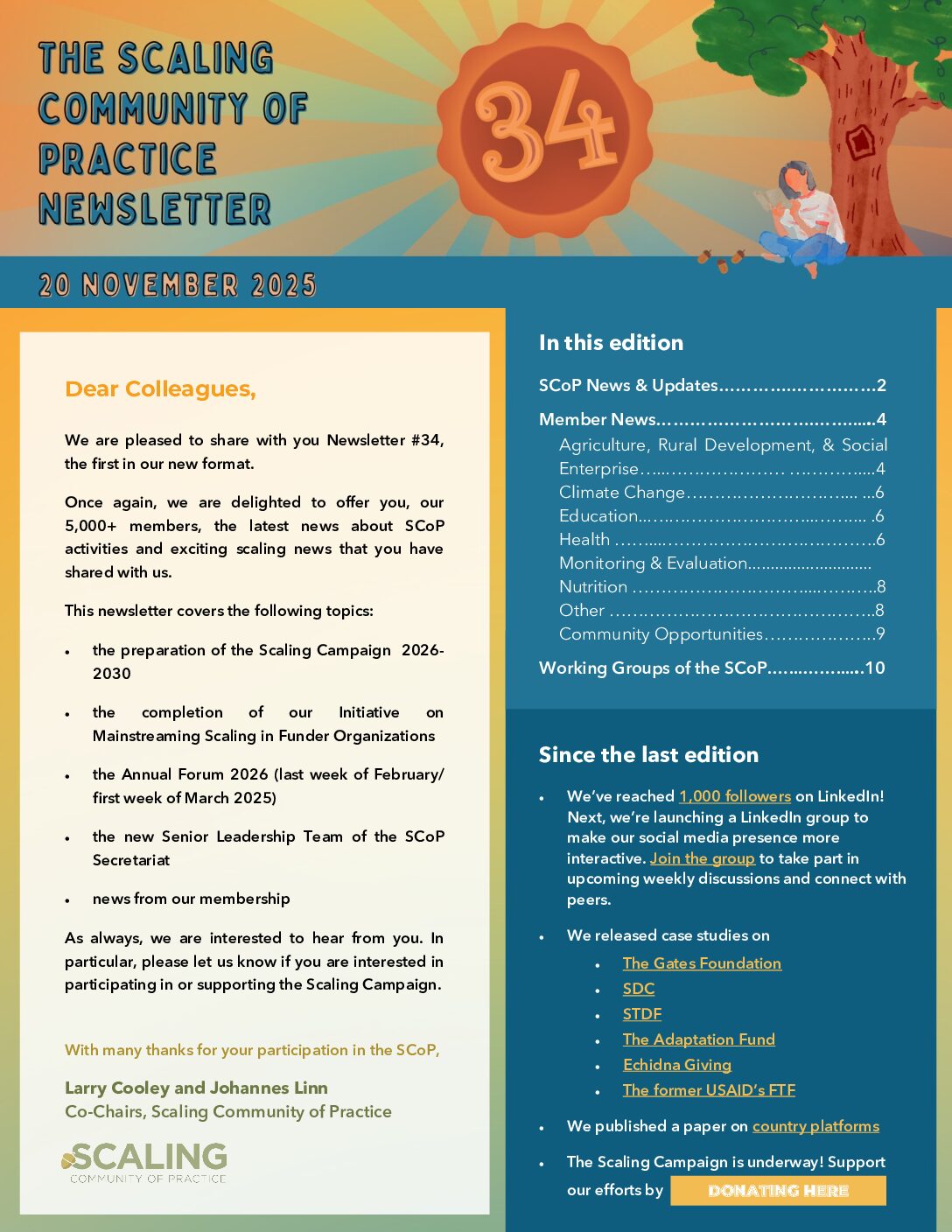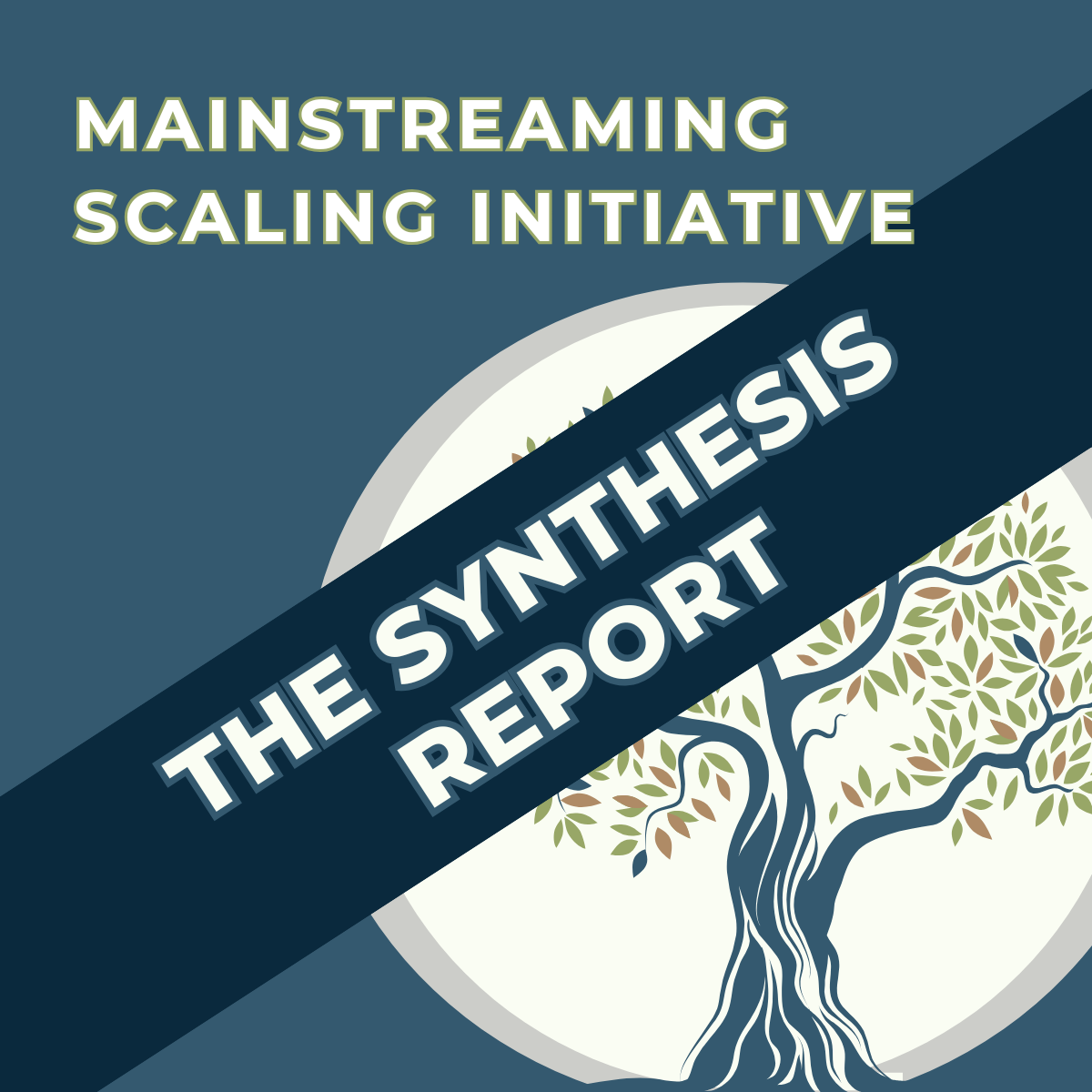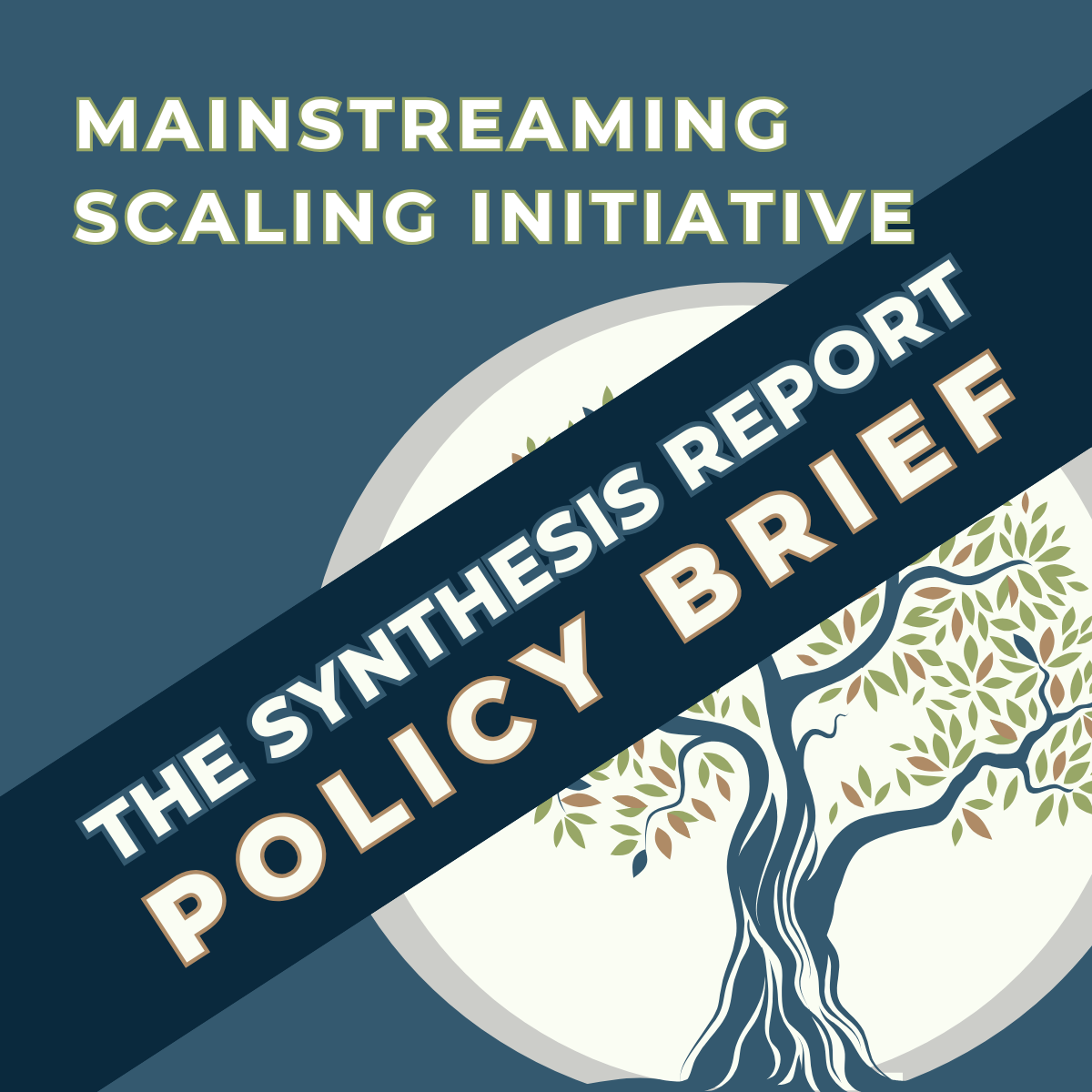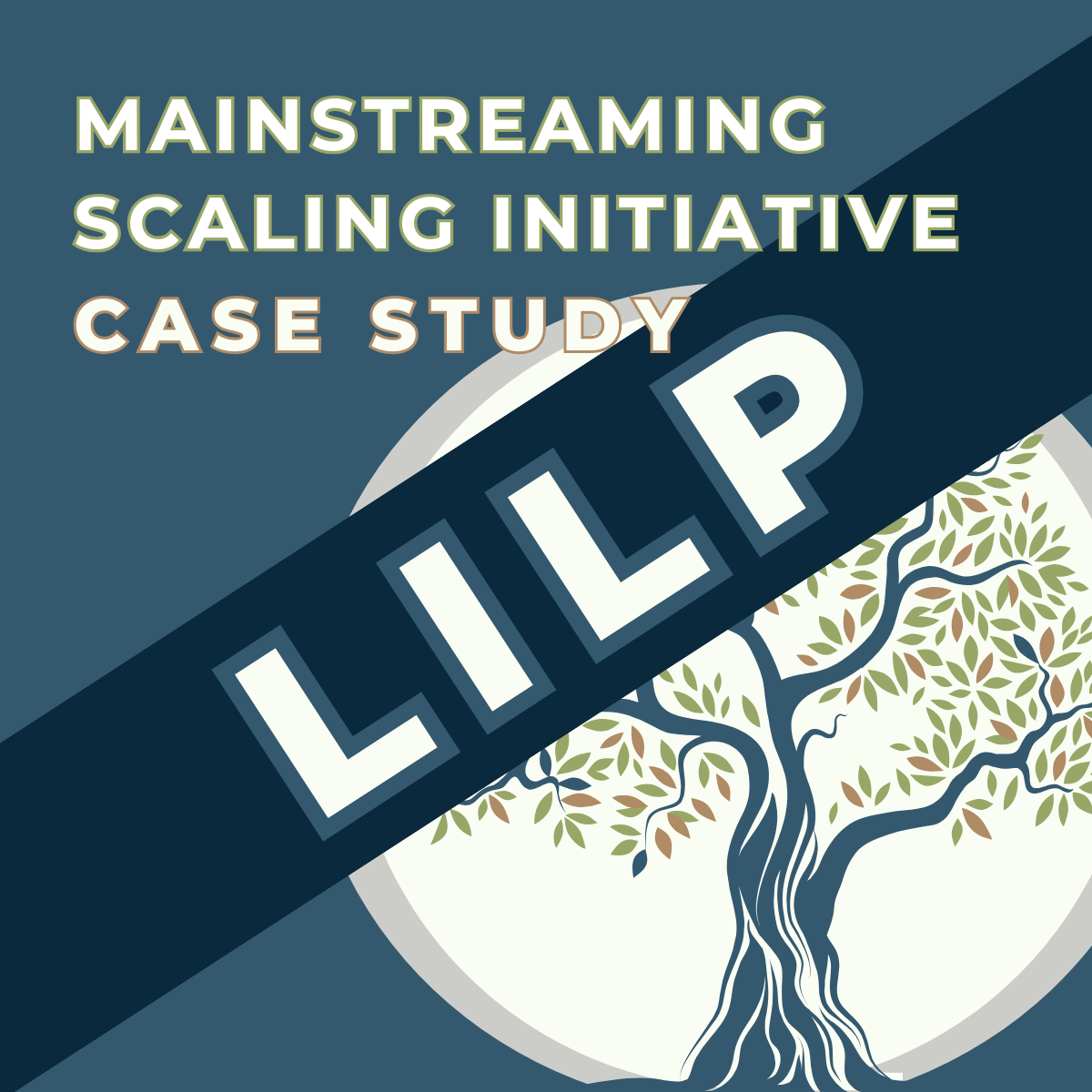Dear colleagues,
We are pleased to share with you our Newsletter #34.
Once again, we are delighted to offer you, our 5,000+ members, the latest news about SCoP activities and exciting scaling news that you have shared with us.
This newsletter covers the following topics:
- the preparation of the Scaling Campaign 2026-2030
- the completion of our Initiative on Mainstreaming Scaling in Funder Organizations
- the Annual Forum 2026 (last week of February/first week of March 2025)
- the new Senior Leadership Team of the SCoP Secretariat
- news from our membership
As always, we are interested to hear from you. In particular, please let us know if you are interested in participating in or supporting the Scaling Campaign.
With many thanks for your participation in the SCoP and your active support of the Scaling Campaign,
Larry Cooley and Johannes Linn
Co-Chairs, Scaling Community of Practice
SCoP News and Updates
Newsleter 33 provided updates on work conducted from November 2024 to June 2025. Below, we provide an update on work from July 2025-September 2025. We also provide updates on upcoming events and activities.
The Scaling Campaign 2026-2030
As we informed you in our last two newsletters, we are preparing the Scaling Campaign 2026-2030, which we expect to launch early in March 2026 in response to the current crisis in development and climate finance. This crisis requires that all development and climate actors use the newly constrained financial resources more efficiently and effectively, and this in turn means that they need to focus on how to integrate a systematic scaling approach into their operational approaches.
The Scaling Campaign 2026-2030 is designed to mainstream transformational scaling in the institutional ecosystem of development and climate actors (governments, development banks, commercial and social enterprises, innovators, official and charitable funders, academia and think tanks, and other intermediary organizations).
Over the last nine months we have been very busy with the preparation of the Campaign in the following areas:
- Organizational set up of the SCoP: As of 1 July 2025, we have completed the transition of the SCoP from Management Systems International (MSI) as our administrative and financial host to Dalberg Catalyst, a global nonprofit organization whose mission is to co-create and accelerate systems solutions to some of the world’s most pressing problems.
- Approach and substantive focus of the Campaign: We prepared an updated summary of the Campaign that lays out the rationale and approach for the Campaign. We also updated a list of possible new substantive areas through which the Campaign would like to actively pursue its agenda of mainstreaming scaling.
- Partnerships: It is clear to us that the SCoP will succeed with the Campaign only if we work closely with all of our members. We have therefore started a systematic outreach to potential partners. Please let us know if you would like to engage with the Campaign in support of its major activity areas (funders, country platforms, capacity building), including in any of the potential areas noted above, or if you see other areas where you could actively pursue the mainstreaming agenda as part of the Campaign.
- Funding: The SCoP will need core resources to finance the secretariat, the influencing activities, funder engagements, the work to develop country-specific initiatives, and training/capacity building. We are conducting an active fund-raising effort for the Campaign. We look to you, the SCoP membership, to help us identify potential funding sources.
- Early Campaign initiatives: We have already started to prepare one concrete Campaign project:
- RFCC initiative: The Rockefeller Foundation Catalytic Capital is launching the Reimagining Humanitarian Nutrition Security (RHNS) initiative, a 2+1 year pilot program in three fragile states to advance a shared vision of humanitarian food assistance that is closely aligned with long-term nutrition security and climate adaptation plans. The SCoP plans to advise this reimagined approach by embedding scalable principles into its design, implementation, monitoring and evaluation to ensure that after the end of the pilot, the program is scalable and sustainable.
- Membership engagement: Membership engagement and support for the Campaign will be critical for its success. The SCoP Working Groups are one avenue for doing so. Partnerships and support for fundraising are others. Where we have projects at country level, we hope to actively involve SCoP members from the country concerned.
Mainstreaming Scaling in Funder Organizations
As preparation for the Scaling Campaign, the SCoP launched its flagship analysis Mainstreaming Scaling in Funder Organizations in 2023 as a three-year action-research project designed to gather and document the experience of development and climate funders in integrating scaling systematically into their operational policies and practices. The objective of this initiative has been to accumulate and share best practices, to identify major challenges, and to promote more effective support for scaling among funder organizations with the ultimate goal of helping countries achieve sustainable impact at scale.
We have now completed 27 case studies and have posted 21 case studies documenting and analyzing how specific funders have mainstreamed systematic approaches to scaling – or tried to do so — in their operational policies and practices. We also have also posted a brief overview of scaling by education funders and by agriculture funders. We expect to publish similar overviews regarding private foundations and innovation funders in the near future. Based on these case studies and analyses, we will prepare a Synthesis Report by December 2025 that will summarize findings and lessons. This report will build on the Interim Synthesis Report and Policy Brief that were posted in June 2024, based on the first 12 case studies.
In addition, we published a number of special studies prepared in support of the Mainstreaming Initiative:
- Perspective of recipients
- Mainstreaming Tracker Tool
- Evaluation methodologies and practices of official funders
- Scaling and localization
- Scaling and country platforms
- Scaling fundamentals
We have started active dissemination of the case studies and supplementary analyses with webinars organized by the Mainstreaming Working Group. We also organized major events to share preliminary findings and to promote the core ideas of the mainstreaming agenda among funder organizations. These events included (i) a hybrid session in December 2024 in Washington, DC, jointly organized with the Society for International Development, (ii) a hybrid event in June 2025 in Paris, jointly with Agence Française de Développement (AFD), (iii) a virtual official side event organized with AFD and OECD-DAC at the 4th Financing for Development Conference in Sevilla in July 2025, and (iv) a session at the Annual Resilience Forum of the African Development Bank in October 2025.
The Annual Forum 2026
We have started the preparation of the Annual Forum 2026. As in recent years, it will be an all-virtual event consisting of three plenary sessions and seven sessions organized by SCoP Working Groups. These sessions will take place between 23 February and 6 March.
The plenary sessions will report on the findings and lessons of the Mainstreaming Initiative, launch the Scaling Campaign 2026-2030 and map out next steps for implementation of the Campaign. The Working Group sessions will explore a range of current scaling issues and examine how each Group can support the Campaign.
The New Senior Leadership Team
With a view to placing the SCoP on a sustainable footing and creating an effective secretariat for the Scaling Campaign 2026-2030, we have now expanded and realigned the SCoP’s Senior Leadership Team (SLT) as follows (links provide brief biographies for each SLT member):
- Larry Cooley and Johannes Linn (Co-Chairs)
- Todd Kirkbride (Managing Director for Strategy & Partnerships)
- Charlotte Coogan (Program Manager)
- Richard Kohl (Director of Strategic Learning & Practice)
- Leah Sly (Interim Program Manager)
- Koldo Echebarría (Senior Advisor)
- Karin Kemper (Senior Advisor)
Member news (by working group)
Agriculture and Rural Development
Andassa Livestock Research Center
Scaling Improved Forages to Strengthen Livestock Feed Systems in Western Amhara, Ethiopia – The Andassa Livestock Research Center has identified a promising pathway to scaling the use of Desho and Napier grasses to tackle chronic livestock feed shortages in the Burie district of Western Amhara. Using a participatory approach through Farmer Research and Extension Groups, the initiative engaged 119 farmers across four years, supported by training, field days, and strong stakeholder collaboration. Desho grass showed higher yields and greater farmer preference due to its adaptability, palatability, and soil conservation benefits. Farmers not only expanded production on their own land but also shared planting materials with others, spreading adoption organically. By the end of the four year intervention, the total land under production had nearly doubled, and the number of farmers using the grasses grew from 83 to 210. While market supply was a limiting factor for uptake early in the program, local farmers are now engaged in selling root splits to meet the growing demand for the two grass types. The project demonstrates how participatory scaling, local partnerships, and continuous learning can drive sustainable innovation in smallholder livestock systems.
Habtemariam Assefa
CGIAR Scaling for Impact Program
Accelerating the Translation of Research Innovations into Delivery and Impact – The CGIAR Scaling for Impact (S4I) Program is accelerating the pace at which research innovations are propelled into impact across agrifood systems, creating the architecture for CGIAR to deliver outcomes at scale. Building on lessons from the 2022–2024 CGIAR Portfolio, S4I now structures its work around three Grand Challenges: closing the climate adaptation gap through scalable climate services and smart water management; delivering inputs and services at scale through inclusive market systems; and driving demand, shaping behavior, and activating policy for nutrition. A major advance during the inception phase is the transition of the Technologies for African Agricultural Transformation (TAAT) Clearinghouse into S4I, which will serve as the foundation for a global clearinghouse of innovations that helps governments and investors identify, package, and embed CGIAR solutions into national and international programs.
Timothy J. Krupnik
An example of an activity held under S4I is the “Game-On: Rethinking Innovation for Impact at Scale” event (22 Apr 2025), in which CGIAR held a serious gaming session during CGIAR Science Week to simulate decision-making on prioritizing innovations for scale. Participants acted as “funders,” allocated limited resources, mapped out scaling pathways, and surfaced real tensions about context variability, bundling of innovations, and trade-offs in investment. The exercise underscored how scaling isn’t merely replication but requires dynamic adaptation, system sensitivity, and strategic portfolio management.
Maherin Ahmed
The program also published a case study: “From Pilot to Practice: Why Agricultural Innovations Face Scaling Challenges” which reflects on why many AgriTech or system innovations succeed in pilots but stall in broader adoption. The article explores institutional constraints, capacity gaps, and mismatch between innovation design and real-world complexity as key barriers. Authors: Aditya Korekallu Srinivasa, Bhuvana N, and Ravi Nandi
Maherin Ahmed
FAO
Breaking Barriers to Scale: Insights from FAO’s Pathways to #ZeroHunger Forum – At FAO’s Science & Innovation Forum on October 18, 2024, the session “From Start‑up to Scale: Pathways to #ZeroHunger” brought together diverse stakeholders—from grassroots innovators and government bodies to UN agencies and private-sector partners—to explore how agrifood innovations can be scaled effectively. Through storytelling, examples like India’s SEWA and Chile’s PROCASUR illustrated how community-led solutions can expand through knowledge-sharing and financial inclusion. A reflective panel emphasized that successful scaling requires adaptive, locally tailored approaches, tolerance for failure, risk-taking, and strong multi-sector partnerships. The session concluded with a clear call to integrate science, innovation, and investment in systemic pathways in order to transform the agrifood landscape one scalable solution at a time.
Martina Miracapillo Martina.Miracapillo@fao.org
AIM for Scale
Turning Proven Agricultural Innovations into Widespread Impact – Launched at COP28, AIM for Scale intends to tackle one of agriculture’s biggest challenges: the failure of effective innovations to reach farmers at scale. Funded by the United Arab Emirates and the Gates Foundation, the effort focuses on identifying high-impact and scalable innovations, supporting country- and region-specific scaling strategies, and improving coordination across the fragmented landscape of funders and implementers. Recently, the Breakthrough Institute was commissioned by the United Arab Emirates’ International Affairs Office to write a report to evaluate AIM for Scale’s approach and provide recommendations on their strategic direction. Consistent with findings from the SCoP’s Mainstreaming Initiative, the recent report highlights persistent barriers to scaling- short-term pilots, fragmented funding, limited coordination, and inadequate monitoring of long term outcomes—and outlines how AIM for Scale can provide training, technical assistance, and rigorous assessments to strengthen scaling practices across governments and organizations.
Paul Winters
Precision Development (PxD)
Innovation Meets Scale: PxD Delivers Weather Forecasts to 38 Million Farmers – In 2023, India’s Ministry of Agriculture & Farmers Welfare (MoA&FW) signed an MoU with the Development Innovation Lab India (DIL-India) to pilot and scale solutions at the intersection of climate change, food security, and farmer welfare. As part of this initiative, PxD partnered with DIL-India and MoA&FW to deliver seasonal forecasts digitally to farmers in 2024. In 2025, the Human-Centered Weather Forecasts (HCWF) initiative at the University of Chicago achieved a step change in technology by developing pioneering mid to long-range AI-powered monsoon onset forecasts. PxD and DIL-India, together with MoA&FW and the Department of Agriculture and Farmers’ Empowerment (DAFE) in Odisha, translated these forecasts into accessible, actionable messages through iterative design, testing, and learning, and embedded their delivery into public dissemination systems. As a result, these improved onset forecasts reached 38 million farmers nationwide. This combination of technological breakthrough and effective scaling through government systems illustrates how PxD is building pathways from innovation to sustainable national adoption, ensuring millions of smallholders can benefit from cutting-edge forecasts year after year.
Madhav Vaidyanathan
Responsible Innovations
Responsible Scaling in Agricultural Research: Achieving Greater Impact by Integrating Inclusion, Reflexivity, and Power into Innovation Systems – As agricultural research for development seeks greater impact, responsible scaling provides a framework for ensuring that innovation benefits are equitable, inclusive, and sustainable. Drawing on recent discussions in Cape Town, this piece outlines how agricultural innovation systems can integrate responsibility in practice—by aligning social inclusion, reflexivity, and power awareness across institutional, operational, and cultural dimensions.
Erin McGuire
Climate Change
NYU
How do you scale initiatives that are grassroots and community-led? – The recently published book Global Youth Protest, Climate and Education asks pertinent questions around the role of civic engagement in sparking meaningful institutional transformation. Among those interrogations is EVA, a leadership school dedicated to the development of young people from the Ecuadorian Amazon. As explored in the chapter “Defenders of the Rainforest” coauthored by María Loida Andi López, Steven Carlson, Diana Chavez, Uyunkar Domingo Peas Nampichkai and Arianna Schindle, it represents the fulfillment of a long-held vision to establish a local capacity-building channel for the next generation of capable leaders, who can respond to the challenges of modern times. As its founders, educators and students reflect on the success of its launch and vision, it propels us to ask how to adapt this community-led model to other territories in the region.
Jennifer Lauren
Education
Elimu-Soko
Launch of the Teaching Innovation Lab – Elimu-Soko is pleased to launch the Teaching Innovation Lab, in collaboration with the Gates Foundation. The Lab will pilot and scale evidence-based, cost-effective interventions for teacher training. The Lab will launch a pan-African facility that will make strategic investments across 4-5 innovation windows targeting innovations that dramatically improve foundational literacy and numeracy instruction within the fiscal constraints African governments face.
Muna Ngenda
Health
ExpandNet/Partners in Expanding Health Quality and Access
ExpandNet update – This is an update on ExpandNet’s work over the last six months:
- Distance scale-up capacity building for leaders from seven Francophone African countries: Drs. Cheikh Seck and Abdoulaye Ousseini recently led a virtual learning series for the staff and collaborators of Evidence for Sustainable Human Development Systems in Africa (EVIHDAF). Over a six-week period from May to July 2025, the EVIHDAF team met weekly to learn about and discuss applying ExpandNet’s framework and approach to systemic scaling retrospectively to their own work. As the series concluded, the participants committed themselves to supporting and promoting the application of ExpandNet/WHO scaling guidance in their work to support change-management processes in West and Central African countries moving forward.
- Nigeria workshop on systematic scale-up using the ExpandNet approach: The Abuja-based Development Outcomes Center (DOS-C) – the Nigerian ExpandNet Affiliate Organization – recently led a three-day workshop on applying ExpandNet’s scaling approach for several grantees of the Gates Foundation in Nigeria. This highly participatory training included interactive group work exploring the science of scaling, sharing scaling case-study experience, and exercises to help participants apply global scale-up learning and principles in their own projects and programs
Laura Ghiron
Population Services International (PSI)
Impactful Adolescent Family Planning Programs at Scale: Navigating the Trade-Offs – Despite clear evidence on what works to support improvements in ASRH outcomes, taking impactful programming to scale is rarely straightforward. This brief draws on experiences from the A360 and Connect projects in Ethiopia, Nigeria, Kenya, Bangladesh, and Tanzania to explore the difficult—but necessary—trade-off questions implementers face when designing for both impact and scale: Do we invest in demand creation or in strengthening service delivery? Do we keep interventions simple to facilitate scale—or intervene deeply to mitigate root causes? Whose goals do we prioritize—government or donor? Do we prioritize reaching the groups most impacted by inequities—or use a broader approach to reach all?
These and other trade-offs determine whether programs remain impactful at scale—or risk becoming scalable but ineffective. We hope this resource sparks reflection and conversation on how to build adolescent family planning programs that are not only effective, but lasting.
Melanie Yahner; Mary Phillips; Meghan Cutherell; Farahat Bello
Spring Impact
New Report – Preventing CSA at Scale: What it Takes – A new study by Spring Impact, supported by Oak Foundation, challenges the assumption that childhood sexual abuse (CSA) prevention is too complex to scale. It charts how 17 organisations are successfully scaling solutions to prevent CSA — reaching more children, embedding prevention into public systems, and sustaining impact over time. The report also uncovers common barriers and enablers to scaling in sensitive systems, serving as both a learning tool and a call to action for practitioners, funders, and policymakers: CSA prevention is urgently needed and possible to achieve at scale. Download the full report.
Mario Bolivar, Amy Cuffley
Monitoring & Evaluation
SCoP M&E Working Group
Scaling evaluation methodologies and practices workshop – On 7 October 2025, the SCoP’s Monitoring and Evaluation Working Group convened an informal, off-the-record workshop with 20 representatives from official funder organizations, from the OECD-DAC Secretariat, and from the Scaling Community of Practice (SCoP) to discuss the extent to which — and how — scaling is considered in official funders’ evaluation methodologies and practice. The session was a follow-up to a SCoP analytical study prepared by Linn and Yilmaz that reviewed the published policies and practices of OECD-DAC, MOPAN, and 18 large bilateral and multilateral official funder agencies. The study identified a variety of good practices but concluded that, in general, scaling continues to receive little or no systematic treatment in the evaluation methodologies and practices of most official donors. The discussion generated an array of possible follow-up actions including a possible initiative under the Scaling Campaign due to be launched by the SCoP early in 2026.
Nutrition
HarvestPlus
Scaling Success: Vitamin A Maize Reaches over 65 Million in Nigeria – In Nigeria, HarvestPlus and partners introduced biofortified maize to combat widespread vitamin A deficiency. Through persistence, innovation, and partnerships, HarvestPlus achieved a huge success in facilitating development, dissemination, and scaling of climate-smart, vitamin A maize varieties, reaching over 65 million people in the country. Approximately 2 million farmers now cultivate vitamin A maize, which is becoming a staple in Nigerian markets and homes. The initiative strengthened seed systems, created demand, and built market infrastructure, ensuring sustainability. With government support, vitamin A maize is now part of Nigeria’s long-term strategy to combat malnutrition. The scaling journey demonstrates how science, partnerships, and community action can transform food systems, improve nutrition, and bring economic empowerment.
Faith Okiror, Munawar Hussain
Other: Poverty Alleviation, Women’s Social and Economic Empowerment
BRAC
Start-Ups Need Seed Funding, Time & Networks to Launch–– Households in Poverty Aren’t So Different – The magic of successful startup ecosystems isn’t a single element—it’s the integrated support in the early stages of the journey. Remove the workspace, the seed funding, OR the mentorship, and success rates plummet. The same principle explains why the Graduation approach’s ABC package (Assets, Basic Needs, Coaching) generates such consistently strong results for households in extreme poverty. Each element reinforces the others, and we have learned how the combination, managed well, within a time-limited frame, can produce enterprise development for even the poorest households.
Greg Chen, Courtney Calardo
Community Opportunities
The Swiss Agency for Development and Cooperation (SDC)
Expert Coaching on Scaling – The Swiss development agency SDC is currently launching the Transition to Scale phase for selected projects within its Research for Development portfolio. As part of this initiative, SDC is commissioning expert coaching on scaling to directly support the project teams. The Terms of Reference for this mandate have just been published. Entities and individual for whom this opportunity aligns with their availabilities and interests, are invited to submit their tender. Applications should be submitted to sdc.researchdesk@eda.admin.ch by 30 November 2025.



